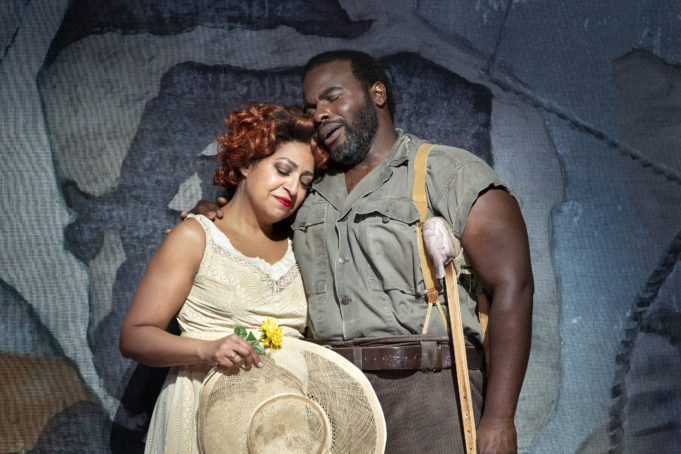There’s merit to the idea that music is a universal language. Cultural references and dialogue weigh heavily on a work’s immediacy and ease of comprehension, though. While recent Fort Worth Opera Festival headliners have brought to Bass Performance Hall the barrios of Buenos Aires and the wiles of a seductive gypsy, Porgy and Bess’ jazz-infused love story is decidedly more relatable for local concertgoers and the general public alike. I came to hear the opening night of George Gershwin’s iconic opera with high hopes, and I was not disappointed.
The opera’s staging (scenic designer Peter Davidson) is ravishing, and the lighting (designer Mark McCullough) is transcendent. Both those elements lent a cinematic quality to many scenes throughout the two-and-a-half hour opera. Act 1 opened with a percussive barrage from the musicians of the Fort Worth Symphony Orchestra (under the baton of FWO artistic director Joe Illick). The stage was packed with around 50 cast members, several of whom gazed down from second-floor doorways. Many of the elements that would become familiar throughout the opera were present — chorus singing, golden-hued lighting, and simultaneous interplay between dozens of actors.
Opening number “Summertime” was tenderly rendered by Clara (soprano Meroë Khalia Adeeb) to swelling lines by the accompanying string section. The opera opens on Catfish Row, a tenement slum in Charleston, South Carolina. Several men are trying their luck at a game of craps. Porgy (baritone Thomas Cannon) soon enters, limping with the help of a crutch. Bess (soprano Indira Mahajan) chats with the gambling men while swigging whiskey and making lewd jokes. As a reddening evening light poured in from stage right, a gambling drunkard named Crown (baritone Norman Garrett) started a brawl with a fisherman named Robbins (tenor Chaz’men Williams-Ali) that ended in the fisherman’s death.
Dozens of mourners gathered to sing a haunting dirge, “Gone, Gone, Gone.” The power of the tight-knit chorus came to the fore in this scene. The score makes generous use of polyphony and call and response. Robbins’ widow Serena (soprano Karen Slack) fired off vocal pyrotechnics during her aria, “My Man’s Gone Now.” Some moments felt oddly upbeat, but the virtuosic solo was a reminder that coloratura is not solely the domain of Mozart.
The lighting turned a cold, fluorescent white when the detective (actor Tyler Cochran) entered to question the mourners about the murder. The next morning, Porgy, who is in good spirits due to his growing romantic relationship with Bess, sang an upbeat rendition of “I Got Plenty O’ Nuthin” to the accompaniment of a banjo and sparse orchestral lines.
One of the most humorous moments soon followed as a drug peddler (tenor Jermaine Smith) was caught selling “happy dust” by Maria (contralto Gwendolyn Brown).
“Ain’t no one going to peddle happy dust around my shop,” she sang, holding out the word happy in a high vibrato.
“Come on, old lady,” Smith retorted. “I thought we were friends.”
“Oh!” Brown shot back before reaching for a meat cleaver. “Friends with you? Ah, hell no!”
The musical highlight of the opera unfolded in Scene 3 as Porgy and Bess confessed their mutual love for each other through the strains of Gershwin’s “Bess, You Is My Woman Now.” After each singer delivered the opening verse to the iconic song, their love became palpable onstage as they embraced and sang an interviewing love duet without overdelivering the intimate moment. Act 2 felt like it dragged. The only new song the audience could indulge in was “There’s a Boat that’s Leavin’ Soon for New York.” Porgy, in true tragic heroine form, gave in to the lure of city life, leaving a distraught Porgy resolving to yet again win her back.
The opening night of Porgy and Bess went off without any technical glitches. The singing was masterfully delivered, and the FWSO musicians supported the onstage drama without detracting from it. I was not expecting such a visually resplendent experience, though. The detailed staging and directional lighting framed the drama onstage in bold and powerful ways. It is an experience that has to be seen and heard to be truly appreciated.
Porgy and Bess continues Sunday (2pm) and Tuesday (7:30pm) at Bass Performance Hall, 525 Commerce St, FW. $22-155. 817-731-0726.













The chorus danced like professionals, and sang better than most full-time opera choruses at the few opera houses that can afford a full-time chorus these days.To pull a full size all black chorus together, and teach most of them how to dance in the big musical scenes, was a major triumph and the overall effect was very exciting. congrats to the choreographer and a lot of gutsy choristers! The Fort Worth Symphony was held to careful dynamic levels so the chorus and the soloists would shine, and the tempos and balance throughout were incredibly controlled by the conductor Mr. Illick. Detail sparkled through from the very first, congrats to the small chime player in the percussion section. The show is a triumph of technical skill and hard work, and the performance has no equal among the six productions I have seen elsewhere. The excitement and espirit de corps can be felt among the opera company personnel, and if the result depends on the leadership from the top, credit Mr. Hultinen for his successful efforts.